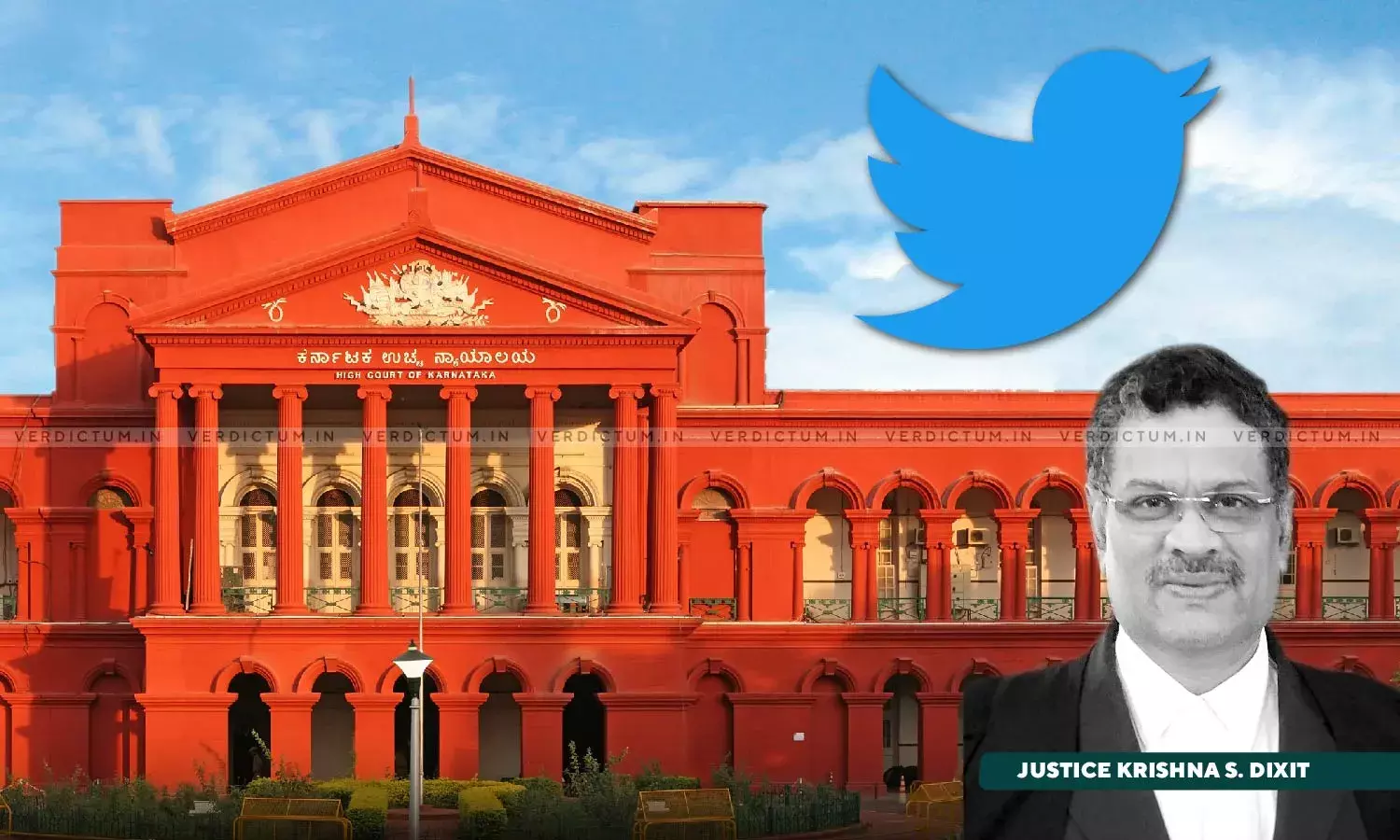Twitter's Plea| Blocking Power Is Not Tweet-Specific, Govt Not Required To Issue Individual Notices To Users Whose Account Is To Be Blocked- Karnataka HC

A Karnataka High Court Bench of Justice Krishna S Dixit has dismissed Twitter's plea against the Centre's blocking orders. The Bench has held that the blocking power of the government is not tweet-specific and that the government is not required to issue notices to individual account holders whose accounts are to be blocked.
In that context, the Court observed, "The restrictive interpretation that the ban is tweet specific may make the provision otiose. Considering the detailed procedure to be adopted before imposing a ban which inter-alia includes clear 48 hour notice, the very purpose of ban may be unfulfilled as the subject tweet would have spread like wild fire by then. A tweet specific ban may encourage the tweeter to get into ‘better luck next time’ approach. Instead, a ban that extends to account could serve a deterrent effect and thus subserve the objective of the Statute."
The Court also clarified that "The submission of petitioner’s counsel that Rule 8(1) of the Website Blocking Rules imposes a duty on the Designated Officer to make all reasonable efforts to identify the user of account, is only a half truth inasmuch as even there, the expression employed is ‘to identify the person or intermediary’. The disjunctive ‘or’ is used, giving an option to the authority to identify either the user of account or the intermediary. The word ‘both’ is conspicuously absent in the Rule. It is not as though the petitioner had furnished particulars of users of the accounts and even then the respondents chose not to notify them. Sections 69A(2) & 87 of the Act, amongst other, confer Rule making power on the Central Government; sub-section (3) of section 87 prescribes laying procedure. After being laid, the Parliament has not altered their text, particularly of Rules 8 & 9, to accord with petitioner’s argument. If Parliament intended that both the intermediary and the user of the account should be entailed with notice, it would have simply substituted the word ‘and’ for ‘or’, such a power apparently availing from the very text of section 87(3)."
Senior Counsel Aravind Datar and Senior Counsel Ashok Haranahalli, among others, appeared for the petitioner. ASGI Shankaranarayanan and CGSPC Kumar MN appeared for the respondents.
In this case, a writ petition was filed under Articles 226 and 227 of the Indian Constitution, praying to quash the blocking orders issued by the Government.
On hearing the parties, the Court indulged in a detailed examination of the relevant statutes and a catena of precedents.
Subsequently, the Court observed that Section 69A of the IT Act should not be interpreted restrictively or literally, and that the provision must be construed as empowering the Central Government to direct blocking of any information which may include an individual post/tweet/message or foreclosing of user accounts in their entirety, both of which are identified through a specific URL. In that context, it was further said that "The text, context & expanse of this provision give abundant scope for the argument that there is a lurking norm enacted to avert imminent harm to the societal interest at large. State need not await the arrival of an avalanche of mishaps; it can take all preventive measures, in anticipation of the danger, more particularly when undoing of the damage is difficult, regard being had to its enormity. To put it metaphorically, a surgeon does not wait till gangrene is developed. A stitch in time saves nine. The impugned action could be both preventive and curative".
Further, the Court was convinced that the Blocking Orders were reasoned decisions and that they were founded on stronger footings of law, facts and evidentiary material. The Court noted that the objectionable content contained outrageous content. In that context, it was said that "many are treacherous & anti-national; many have abundant propensity to incite commission of cognizable offences relating to sovereignty & integrity of India, security of the State and public order. No reasonable person in the trade would agree with the contention of petitioner that, reasons for the impugned orders are lacking".
The Court also held that it was plausibly explained why no notice was issued to the users of the blocked accounts. The Court noted that the the objectionable contents posted by them were anti-India & seditious. Further, the Court said that "They had religious contents that were designed to incite violence and affect communal harmony in the country. A section of originators of the information comprised of terrorists, sedition seekers or their sympathisers, foreign adversaries who intend to discredit & destabilize India and jeopardize national security on communal lines."
Upholding the validity of the blocking orders, the Court observed that "Since Blocking Orders do have implications on the exercise of that right to whom it avails, the government may in its discretion hear the users of account. However, none of them has come forward to complain the infringement of their right. It is not that they are all downtrodden members of society or otherwise suffer from some handicap and therefore, they are disabled from working out the remedies on their own. Apparently, they are literate; presumably have more exposure to the outer world, as the very objectionable content of their posts would indicate. It is not that petitioner is espousing their cause, such espousal obviously not being legally sanctioned. It is also not that they have authorized the petitioner to launch this legal battle on their behalf".
Cause Title: X Corp. v. Union of India & Anr.
Click here to read/download the Judgment

